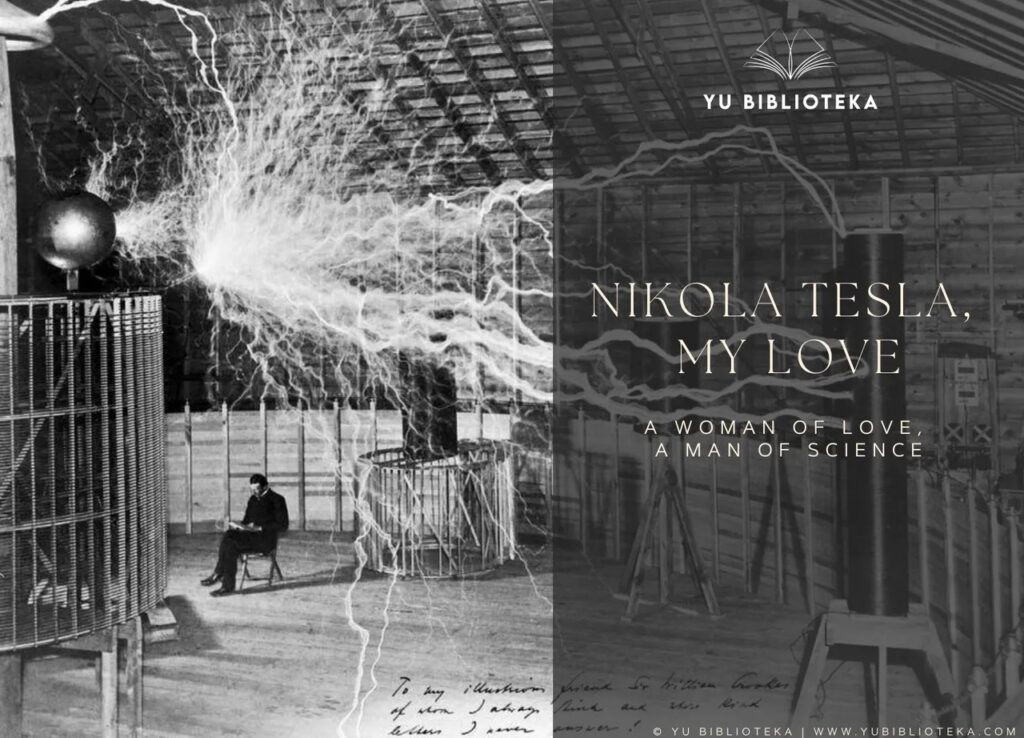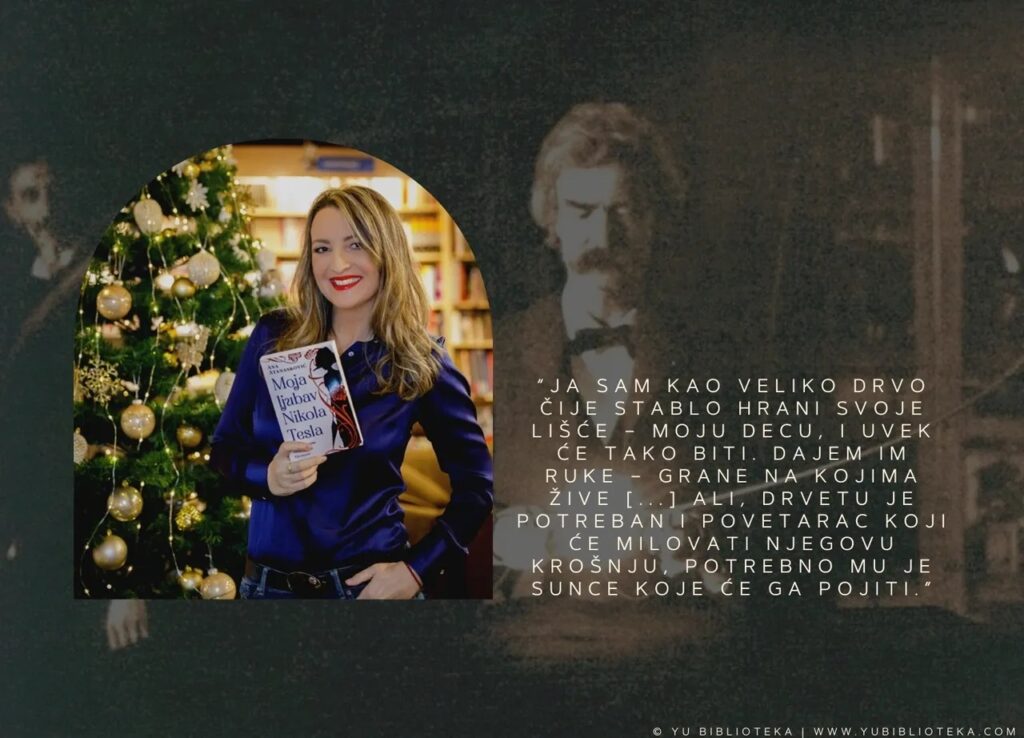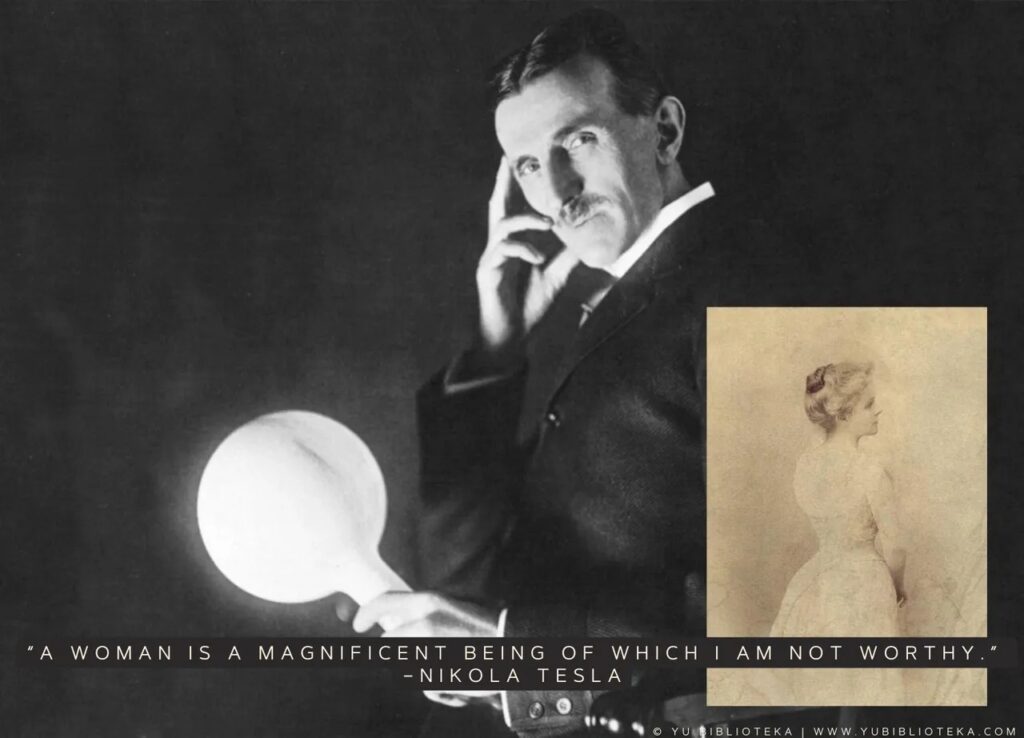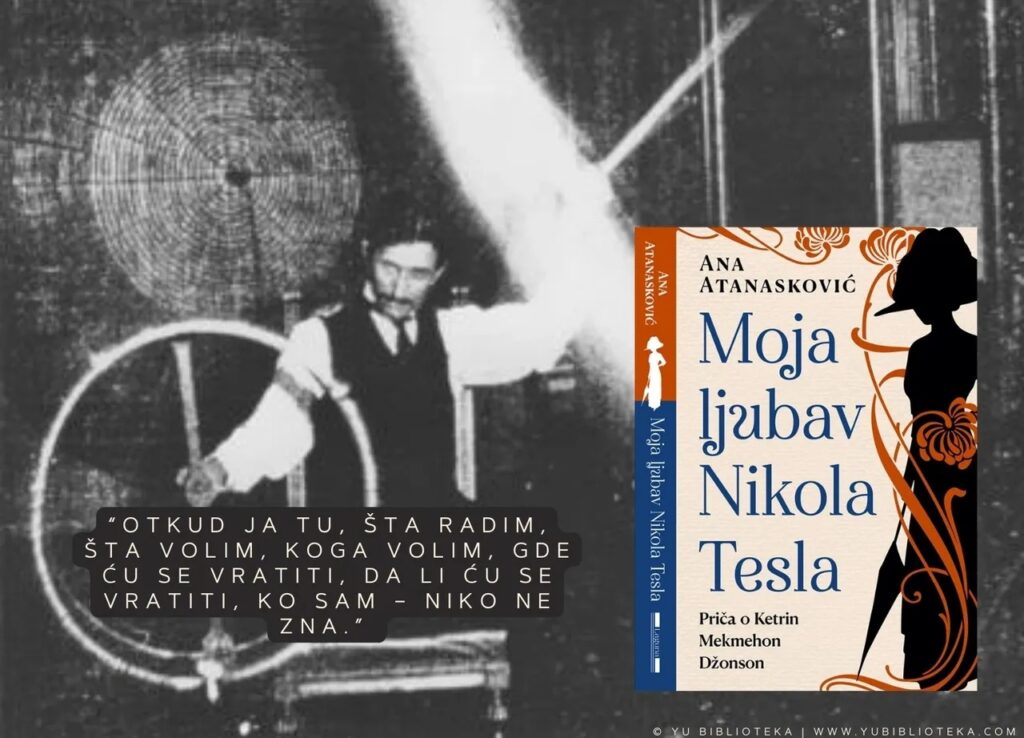A woman of love, a man of science

The hot July of 2022 celebrated the 146th birthday of Nikola Tesla. We have all come to know him as a scientist, the world’s greatest inventor, a visionary and a man of distant future. We raised our eyebrows in surprise and often disbelief over his quirky behavior and eccentric habits – just think of his obsession with the number three, unusual inclination to pigeons, aversion to women wearing earrings, and everything else you might have read about him.
We grew up believing Nikola Tesla was a man of science and OCD, that he lived the same way he died – alone, estranged, ostracized – that he never had a close friend, let alone a woman in his life, and that being Eastern European meant he had no class, no wealth, and no social grasp.
Ana Atanasković’s book, Nikola Tesla, My Love, is here to tear the prejudice down.
The novel follows a woman at the turn of the 19th century, as she finds her way through marriage, New York, social circles of the ever-changing society, motherhood, and passion. The tasty journal entries of Katharine McMahon Johnson, a historical figure carved into the lives of men around her, give us a different look at the famous Serbian scientist.

The book comes a full circle from the very first pages until the last entries in her journal, starting as a peaceful river before the earth-shattering lava disrupts her flow. When turmoil passes and the violent rapids are gone, the river returns to tranquility with harmonious heaven waiting at the riverbank.
Now, don’t you dare think for a moment that just because his name is in the title, that this is a book about Tesla. He is the object of her affection, the fountain of her fiery passion, and the bane of her existence, but as you flick through the pages and drink from the fresh spring of female search for identity and purpose, you will find a woman’s struggle to raise her voice and stay relevant in the time when women were nothing but ornaments to society.
Katharine McMahon Johnson
“Ja sam kao veliko drvo čije stablo hrani svoje lišće – moju decu, i uvek će tako biti. Dajem im ruke – grane na kojima žive […] Ali, drvetu je potreban i povetarac koji će milovati njegovu krošnju, potrebno mu je sunce koje će ga pojiti.”
Katharine is a devoted wife and mother, yet after fulfilling her designated roles, a giant hole gapes inside of her, as if having it all takes something away from you. You will catch fleeting glimpses of infidelity in her writings, but the kind that she’ll keep forever hidden, jealously protected by the leather binder of her journal.
If you google her name, you will find it footnoted to the names of others. She was the wife of Robert Johnson, an American writer and diplomat. She was the mother of Owen Johnson, another writer. And she was a friend, perhaps the dearest girlfriend of Nikola Tesla. Her life is reduced to these men’s names, and without them the society wouldn’t have recognized her existence.

Tesla and Katharine McMahon became friends through the social graces of her husband. Over the years, Robert and Kate had famous artists, inventors and social influencers over for dinners and holidays. Tesla silently opened the backdoor to their hospitality and snuck his way into the Johnson family. There was a time when both of them couldn’t imagine spending Christmas without the presence of the Serbian wizard.
Katharine’s longing for Tesla is directly opposed to her relationship with Robert. Everything in her marriage is tepid, restrained, and moderate. Her youth longs for skin-burning fires, but Robert Johnson’s touch produces only lukewarm sparks that light nothing. Haven’t we all suffered such a controlled and bashful lover?
We have no choice but to understand the proper, civil way her husband loves her in the bedroom as it, too, reflects the 19th century social dictation of how a man should treat his woman.
“A woman is a magnificent being of which I am not worthy.” –Nikola Tesla
Katharine writes boldly about her and her husband’s dear friend, his mesmerizing appearance, the man of bright inventions and even brighter plans for the future. She describes the fires that feed her infatuation for a man outside her marriage so perfectly, that you are likely to shake your head and begin to form a strong opinion.
If the 20-year-old me were to read the novel, she would judge her straight up from the start, from the moment she started daydreaming about another man. But today me has more empathy than that. The more you read the more you will come to see that her struggles with her own emotions are the struggles of a modern woman. You couldn’t even tell the story is set at the turn of the century were it not for the social decorum and the birth of the famous buildings.
In case you were ever wondering what a married woman felt like in that time, this is it. A seemingly happy married woman longing for another man, a man outside of her marriage and her reach – Nikola Tesla remained woman-less and virgin until death. I write seemingly, and on the printed copy underline it with a bold, black marker, as that’s what society does to us, women of the 19th, 20th, and 21st centuries equally. It convinces us that we really should be happy and content with what we have, and if we stray even for the faintest moment looking into the true meaning of our happiness, it crushes us with guilt and shame. Guilt for not being happy when we should, shame for wanting something we don’t have.
After all, passing judgment is the easiest emotion in us, the laziest one to provoke. It requires no cognitive processes, nothing other than ignorance and misunderstanding. I trust the enlightened and deeply human parts of you, the readers, regardless of gender, nationality or age, will not judge Katharine for seeking passion, and for being humanly imperfect and weak.
Don’t be like the 20-year-old me.
New York, New York
Words slide down each journal entry, like a cold glass of lemonade on a feverish summer day. There’s little to imply that the book was written in the 21st century, as descriptions of people and places are authentic. The author either lived in New York more than a hundred years ago, or found a secret combination to the time machine that transported her straight to Katharine McMahon’s heart and mind.
We experience her platonic love and meet both Tesla and Robert in their own unique ways, as well as every person that steps into the Johnson household. Their characters’ appearances might be brief, but they add to the exceptionalism of the time and deepen Katharine’s humanity. However, there is one character that emanates from every page, dwells in every word and takes over the plot wholly.
The Statue of Liberty is about to be erected, the Brooklyn Bridge nearly finished… The city of New York plays an important role in Katharine’s life and love. We see it transform, changed by people and their innovations, serving as a safe harbor for the heroine to come back to. She changes, matures, grows old, and loses friends, but she finds solace and peace within the concrete jungle of the early 1900s when the city transforms but its soul remains intact.
Everything New York has given birth to during Nikola Tesla’s greatest years will forever live in the streets and majestic architecture for posterity.
Regardless of the title, this is not a story about the woman Nikola Tesla loved. He had only one lover, one spouse, the master, the divinity – science. We know everything there is to know about his scientific achievements, his feud with Edison, reluctance to register his patents, his eccentricity and his fall from the social graces.

Thanks to Ana Atanasković, now we remembered that Tesla was an impeccable dresser, a regular guest at the finest diners and extravagant parties, a dear friend of Mark Twain and Rudyard Kipling, and the dearest honorary member of the Johnson family.
This is a story of self-discovery and self-reflection. The way she loved him was only hers. Words they exchanged and letters they opened now belong to the public. Whatever you think lies inside the covers of this book will take you down a different path, the one that reiterates universal truths about marriage, friendship, what it means to be a woman, and ultimately, love.
There is something timeless in the way a woman loves.
“Otkud ja tu, šta radim, šta volim, koga volim, gde ću se vratiti, da li ću se vratiti, ko sam – niko ne zna.”
Yours,
V.R.
